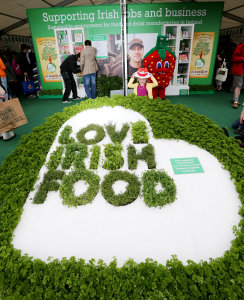Irish consumers spend €1.8bn on imported food brands per year

Irish consumers continue to purchase imported food brands even when Irish alternatives are readily available on shelves
11 November 2013

Love Irish Food will invest €200,000 in a heavyweight advertising campaign in the run up to Christmas to promote Irish products
Love Irish Food, established in 2009 to promote Irish manufactured food and drink brands to consumers, has announced results of a recent study into the Irish food grocery market which looked at the economic impact of choosing Irish manufactured brands versus imported brands and private label produce.
The study, jointly undertaken by Jim Power, economist and chairman of Love Irish Food and Kantar Worldpanel for the 52 weeks ending 18 August 2013, showed the total food grocery market is worth an estimated €7.3bn this year. Of the total branded products represent an estimated €3.3bn or 46% of the market and non-branded and private-label represent the remaining 54% or €3.9bn. Love Irish Food estimates that at least €1.8bn of the €3.3b branded products sold are imported.
When looking at the 110 Love Irish Food member brands, these companies account for 17,043 direct jobs in the Irish economy and downstream almost 30,000 direct and indirect jobs in Ireland result from Love Irish Food member companies. This create a gross wage bill of over €800 million per annum and a contribution to the national exchequer exceeding €250 million per annum.
Love Irish Food will invest €200,000 in a heavyweight advertising campaign in the run up to Christmas to include national radio, digital and TV which will ask consumers to check where their branded products come from or alternatively to ask Love Irish Food as the experts in this regard.
Commenting on the results Jim Power, economist and chairman of Love Irish Food said "The agri-food sector is clearly an industry that can make a very strong contribution to re-building a sustainable economic model. The long term prospects for food production have to be bright; the world’s population is expanding and many areas of traditional food production are suffering from the impact of climate change. The bottom line is that this is an industry with serious potential. As well as making a very high value added contribution to the national economy, the food industry is now the key driver of regional economic activity and the mainstay of rural towns.
He added: "However the key to unlocking that potential is new products and strong brands. Without new products Ireland will be condemned to be a simple producer of commodities. The number of jobs we can create from producing and selling commodities is limited and with increasing automation shrinking rather than growing, the success of Love Irish Food member companies such as Glanbia, Britvic and Cadbury both at home and abroad shows how important the Irish food brand is."
Kieran Rumley, executive director of Love Irish Food added: "We have long been aware of the economic benefits of buying Irish manufactured branded goods over imported alternatives. These new figures confirm these benefits and once again point to the important role of the agri-food sector in Ireland’s economic recovery. It is clear that this high value added indigenous sector, contributes greatly to the creation of jobs and to our economic future".
He continued: "Each and every time a shopper puts a Love Irish Food branded product in their trolley or basket, this helps to safeguard the almost 30,000 jobs supported by Love Irish Food member brands. Collectively, we have the power in our hands to help slowly re-build this economy through our support for the competitive yet undeniably vibrant Irish food and drink sector."
Despite a challenging and fiercely competitive backdrop, at least three industry manufacturing categories, namely sugar, biscuits and ice-cream moved their production abroad resulting in the loss of thousands of jobs and the creation of over €600m in food imports annually.
On the other hand, brands that are able to respond to changing consumer preferences can create success. Recent Kantar figures show that 51% of the top 1000 brands have grown in value sales year on year. This demonstrates that brands that are able to offer innovation to the consumer continue to grow. For instance growth categories in 2013 include: Fresh soups (18%), roast and ground coffee (10%), home baking (9%), take home crisps (10%) and eggs (7%).



 Print
Print






Fans 0
Followers